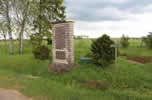


Cyclo-hiking MEUSE
via France, Belgium Rhein and Holland.
From Langres to Hoek van Holland.
DOWNLOAD file
of the detailed route…
GENERAL DATA
| Country | Departures | Arrivals | Tracks | Distance | Year |
FRANCE |
Langres |
HOEK-VAN-HOLLAND (NL) |
MEUSE River and NORTH SEA |
Realized : 1,689 km |
2020 |
Mileage TO GO (the MEUSE) :
- Achieved 1,278 km
- Theoretical 1,033 km
Mileage RETURN (to LILLE by the North Sea coast) :
- Achieved 411 km
- Theoretical 326 km
NOTA : The desired accommodation and tourist tastes are different for everyone. The itineraries proposed for downloading on this page are direct without any detour to the accommodation and points to visit..
SOURCES :
MAPS
|
ACCOMODATIONS
|
|
|
FEEDBACK OF EXPERIENCE
MEUSE IN FRANCE
SOURCE OF THE MEUSE
Many rivers appear in the open air in the form of a good stream. For the Meuse it is only a tiny trickle with almost no flow. Usually there is a stele celebrating the source of this great river. But in 2020 the works, started the year before, were not finished. So we had to make do with a simple construction site ditch.
HAUTE-MARNE - VOSGES - MEUSE
In the departments of Haute-Marne, Vosges and Meuse there is unfortunately NO GREEN WAY or cycle path. These departments have done absolutely nothing for the "Meuse à Vélo". Fortunately the route is mostly on small roads. But BE CAREFUL, too often you find yourself on very big departmental roads with super straight lines; this means that cars drive fast and don't want to slow down. These departments are therefore not recommended for families with young children who do not have perfect control of their straight-line behaviour. A slightly zigzagging trajectory will be VERY dangerous!
This total absence of cycle lanes is all the more inexcusable as for a large portion of the road runs alongside an old railway line that has been totally disused for ages. The rails are often missing. By tearing out the last rails, the transformation into a greenway would be done at low cost since all that would be required would be to lay a road surface. But this would require local political will.
ARDENNES
Everything changes in the Ardennes department from Remilly-Allicourt (near Douzy). There you benefit from the SUPER-MAGNIFIC Trans-Ardennes up to the Belgian border. You can therefore enjoy 124 km of greenway in complete safety to admire the twists and turns of the Meuse river loops. It's a marvellous section. Even the Chooz nuclear power station has not interrupted the greenway since 2019.
MEUSE IN BELGIUM
We were very happy to finally discover the famous Belgian RAVeLs. The ones we discovered along the Meuse are not very good. Too often very narrow and in poor condition.
As in France, the work can stop the cycle path without any proposed diversion. So you suddenly find yourself thrown onto a major road with a lot of traffic. Fortunately the behaviour of Belgian motorists is perfect, they are very respectful of cyclists.
Until Dinant and Namur the river landscapes are very nice. However, before and after Liège the Meuse suffers from the industrial past. The Walloon industrial decline (similar to the French one) has left a horrible scar on the Meuse. Murdered, the river is literally channelled on each side by 4 meter high concrete walls with endless quays between the cities. Quays are of course deserted except for those adjacent to the only remaining activity: the many (useful but unsightly) stone quarries. In short, it's very ugly. Liège, itself, is disappointing because of its decrepitude and, let's say it outright, its dirtiness.
During the last 10 km in Belgium I have been chatting while riding with a Belgian cyclist. He understood and approved of our disappointment, but reassured us by announcing a radically different Maas (name of the Meuse in Dutch)…
MAAS (MEUSE) IN HOLLAND
… and miracle, and oh wonder, indeed everything changes as soon as the Dutch border is reached. On the remaining 440 km to reach its outlet to the North Sea, the Maas will offer us 400 km of SUPERB nature with fantastic tracks. Wonderful landscapes. Bicycle paths in abundance and ALWAYS in perfect condition. Even in the woods there is always a cycle path that runs parallel to the forest roads.
There are sections of small roads… but it is always fully safe because in ALL the villages crossed the speed limit for cars is 30 km/h… and as soon as you are in the countryside it is always limited to 60 km/h!
As in Germany, the cycle tracks are considered as real traffic lanes. They therefore have priority on secondary roads and are subject to well signposted detours in case of works.
All this Maas is truly wonderful with a total immersion in unspoilt nature. An enormous amount of land (even meadows) is left fallow to allow bio-diversity to flourish. The result in terms of landscape is super pleasant.
BACK VIA THE NORTH SEA COAST - HOLLAND
It is not the same landscapes but it is very nice and interesting. Nice, because we pass by many dunes and especially by small charming woods. Interesting, because we discover the colossal Dutch works built to protect the interior of the country from the winter fury of the sea.
It is quite a physical portion on windy days. Indeed the direction of travel is generally south-west… and the dominant winds are from west to south-west. So it is a permanent fight against the wind.
RETURN VIA THE NORTH SEA COAST - BELGIUM
After having gone to the Walloons on the outward journey, we now find ourselves in Flanders. In this Flemish Belgium (almost Dutch culture) we feel a completely different prosperity than in Wallonia (the latter suffering from its too French culture). So housing and roads are in better condition here.
A small diversion inland to greet Bruges. Otherwise on the coast it is the incredible string of huge beaches that border the almost uninterrupted string of towns and villages that stretch all the way to the French border. Passing of course through the very famous Ostend.
GOING - COMING BACK
The cyclo-hiking starts in Langres. You can get there by train from Lyon. But there is a change of TER at Dijon and at Culmont-Chalindrey, and these 2 stations only have stairs for the access to the platforms!
For the return trip from Lille, if you have to transit like us through Paris, the problem is that the TGV Nord no longer takes unmounted bikes. Therefore you have to fall back on the TER, with a change of train at Amiens. In Lille no worries, the Lille-Flandre station is a terminal station, so all the platforms are connected to each other on the same level. On the other hand in Amiens it's Russian roulette because the station is mixed : half is a terminal station, and the other half is a stopover station. And the platforms of this last part have only stairs! We were lucky, our transit was on the right platforms.
SECTIONS
MEUSE FROM THE SOURCE TO THE NORTH SEA
| SLIDESHOW of the portion (in French) |
| Section | Departure | Arrival | Track |
| THE MEUSE | LANGRES | HOEK VAN HOLLAND | GPX |
NORTH SEA - BACK TO FRANCE
| SLIDESHOW of the portion (in French) |
| Section | Departure | Arrival | Track |
| NORTH SEA COAST | HOEK VAN HOLLAND | LILLE | GPX |
ACCOMODATIONS
The entire hike was done in camping mode:
- Belgian campsites are correct (similar to French campsites)..
- The Dutch campsites are of much better quality for a price almost comparable to those in France.
